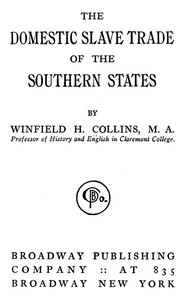The Domestic Slave Trade of the Southern States by Winfield H. Collins
"The Domestic Slave Trade of the Southern States" by Winfield H. Collins is a historical account written in the early 20th century. This work delves into the intricacies and dynamics of the domestic slave trade in the southern United States, chronicling its origins, development, and the various economic, social, and legislative factors that influenced it. Collins aims to provide an accurate portrayal of this complex subject through comprehensive research and extensive use
of primary sources. At the start of the book, Collins sets the stage by discussing the historical background of the slave trade, tracing its roots from the European involvement in the African slave trade to its evolution into domestic trade within the United States. He outlines how various states began to engage in trading slaves, motivated by economic gains and shifting agricultural needs. The narrative highlights key moments in the trade's history, including the rise of cotton cultivation in the southern states, the impact of legislative actions, and the realities of human commodification, making clear the delicate interplay of economics and human rights that characterized this dark chapter in American history. (This is an automatically generated summary.)
Read or download for free
| How to read | Url | Size | |||
|---|---|---|---|---|---|
| Read now! | https://www.gutenberg.org/ebooks/61977.html.images | 309 kB | |||
| EPUB3 (E-readers incl. Send-to-Kindle) | https://www.gutenberg.org/ebooks/61977.epub3.images | 127 kB | |||
| EPUB (older E-readers) | https://www.gutenberg.org/ebooks/61977.epub.images | 130 kB | |||
| Kindle | https://www.gutenberg.org/ebooks/61977.kf8.images | 237 kB | |||
| older Kindles | https://www.gutenberg.org/ebooks/61977.kindle.images | 222 kB | |||
| Plain Text UTF-8 | https://www.gutenberg.org/ebooks/61977.txt.utf-8 | 201 kB | |||
| Download HTML (zip) | https://www.gutenberg.org/cache/epub/61977/pg61977-h.zip | 115 kB | |||
| There may be more files related to this item. | |||||
Similar Books
About this eBook
| Author | Collins, Winfield H. (Winfield Hazlitt), 1868-1927 |
|---|---|
| LoC No. | 04030987 |
| Title | The Domestic Slave Trade of the Southern States |
| Note | Reading ease score: 71.7 (7th grade). Fairly easy to read. |
| Credits |
Produced by Tim Lindell, Graeme Mackreth and the Online Distributed Proofreading Team at https://www.pgdp.net (This file was produced from images generously made available by The Internet Archive/American Libraries.) |
| Language | English |
| LoC Class | E300: History: America: Revolution to the Civil War (1783-1861) |
| Subject | Slave trade -- United States |
| Category | Text |
| EBook-No. | 61977 |
| Release Date | Apr 29, 2020 |
| Copyright Status | Public domain in the USA. |
| Downloads | 87 downloads in the last 30 days. |
| Project Gutenberg eBooks are always free! | |

